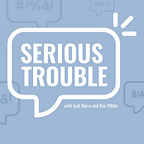Dear listeners,
Happy Fourth of July Week!
Josh and Sara and I will be back to breaking news next week. For now, enjoy this deep dive special episode about how to be a critical consumer of legal news.
First, obviously, keep listening to us. We’re the cat’s ass. But second, do some of these things, discussed in depth in this episode:
Look for news coverage that includes a link to the Supreme Court decision, motion for summary judgment, indictment, or civil complaint. Why? Even if you think you can’t read it, you should look for reporters who think you might. Also, friends, you can read it. Want some training on how to read a legal opinion? Orin Kerr’s classic explanation is great and accessible.
Be skeptical of clickbait titles that seem calculated to outrage you. They’re usually misleading. Here are examples we talked about.
Be skeptical of the “former prosecutors are experts” narrative. Yes, even with me. Carefully evaluate which talking heads you trust.
Be skeptical of “the judge yelled so they hate the prosecution’s case” stories. Those are often wrong.
Spend a little time getting a basic understanding of the stages of criminal and civil cases — arraignment, plea, motions to dismiss, summary judgment, etc. You’ll be a better consumer of legal news when you understand when a development reflects something procedural and purely legal or something that reflects some kind of decision about the merits.
Be extremely skeptical when the press reports on the maximum sentence a defendant is facing — it rarely has anything to do with the likely sentence they face.
In this episode, we also discuss the United States Sentencing Guidelines in depth, and we talk about how Donald Trump’s sentence might be calculated if he were convicted in the Florida documents case. You can follow along with our discussion and actually see what we’re describing at the links below:
The sentencing table, the core document that generates a recommended sentence based on your criminal history and how serious the offense is.
The statutory index, which you use to determine which guideline applies to a particular crime.
Guideline 2M3.3, which would likely apply to a Espionage Act conviction for willfully retaining documents.
The enhancement for obstruction of justice.
The enhancement for organizing or managing other people in the offense.
Part of the nearly incomprehensible system for determining a sentence when someone is convicted of multiple things.
See? You could do this yourself. But you really don’t want to.
Enjoy the show, and your holiday week, and see you next time with a variety of news updates.
Ken






